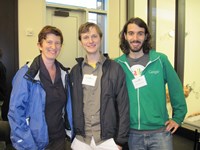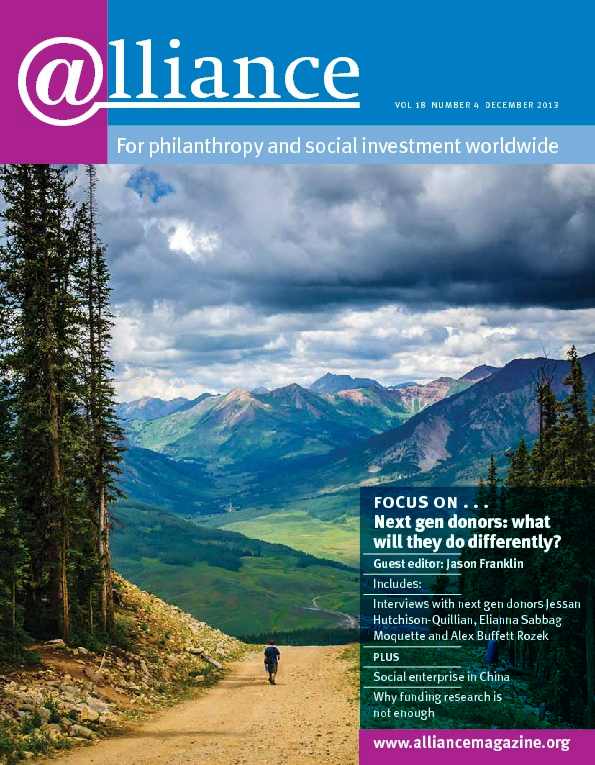‘I have become a volunteer leader, organizing other young people with wealth to to do great things with their giving. I never imagined myself being this type of leader … I’m an engineer!’
Jessan Hutchison-Quillian was brought up in Seattle. In 2007, after graduating as a computer scientist at the age of 20, he went to work for Google. Realizing that his salary would be far in excess of his needs, he began to seek out progressive causes to give to. In 2009, he became involved with Resource Generation. Through Resource Generation, he found Social Justice Fund Northwest, and in 2010 he joined the first SJF Giving Project, a cross-class group of people who come together to fund organizing in the US North-west. He is now the engineer for Google’s Corporate Social Responsibility Team, which aims to build a strong culture of giving at the organization.
Jessan Hutchison-Quillian doesn’t need all the money he makes at Google, so he gives nearly half of it away each year – not just because he can, but because he feels he should. Here he explains the roots of his philanthropy and his commitment to funding social justice issues and community organizing. This interview is based on a Bolder Giving conversation with Jason Franklin[1] and a subsequent phone conversation with Caroline Hartnell.
Can you tell me how you started giving?
My first gift was to the Human Rights Campaign. It was around the presidential elections of 2004 and there was a lot of anti-gay rhetoric. My parents are lesbians so this was upsetting and I wanted to do something about it. I thought, ‘hey, if I give 30 bucks to this it’ll totally solve it.’ I’ve always had this idea that money is one way that you can help change things. Another of my early gifts was to help set up a teaching award in the name of a really great young professor I had who died of cancer – three bucks or something that got me on the donor list for my university for the rest of my life! I think that reflects two different aspects of giving that are common, both for me and for a lot of people. You give for your connections and you also give because of the change you want to see in the world.
It was when I started at Google that I got more deeply into giving. It was already clear to me that I was making way more money than I needed and that I wanted to do something good with the rest. I have been very lucky: my parents have always given me the love and support I need, I’ve had enough to eat and a nice place to live. Others haven’t been so lucky. But I didn’t just want to address basic needs; I wanted to support progressive causes in the US in a way that would be transformative. I also wanted to give internationally because the US economy is based on taking disproportionate resources from the rest of the world and I wanted to give something back. Another reason for getting more into giving at this point was that Google matches your donation up to $6,000 per year, which I wanted to take advantage of.
How did you decide what to give to?
It was a little overwhelming at first. I ended up giving to a lot of large organizations like the American Civil Liberties Union. With things like that, you’re happy to give to them and it’s a good place to start. I think the biggest influence on my thinking was actually a book called The Revolution Will Not Be Funded, which made me think that, instead of building a non-profit myself, I should support existing leaders, especially people from communities that are facing issues of injustice.
But I still felt pretty isolated and it wasn’t until 2009 that I found an organization called Resource Generation, which made all the difference for me. Up to then, I thought that I was the only person in this position of being relatively young and having a good chunk of money to give. It was amazing for me to find that there was a whole community of people wanting to use their money to make progressive change.
I got involved in a local chapter in Seattle and we tried out a new model, the practice group, that’s now become a national model. We meet for six months, and each month each person brings something that they’re interested in and gets feedback from the group. That was really powerful for all of us because it’s very easy to sit on the money and not do anything. Letting go of resources is always hard. Seeing that other people are willing to give big amounts of money just made it feel a lot safer. I knew in my heart it was want I wanted to do, and I couldn’t see how it would be a problem, but there’s always that fear that you’re being naive and you’re going to regret it later.
And you got involved in Social Justice Fund Northwest through Resource Generation?
I did. Resource Generation was great in that it got me moving more of the money but it was Social Justice Fund Northwest that really answered the question of where and how. As I see it, much wealth in the US has been accumulated through a history of injustice and patriarchy. So part of the money I have I don’t really see as mine, but it has come to me and it’s up to me to try to figure out how best to get it back to the people it belongs to, through organizations working on issues like racial and gender justice.
Social Justice Fund Northw est does exactly that. And their model of shared decision-making among donors and activists felt like a good fit for me. In 2010, I joined the first SJF Giving Project – a cross-class group of 15-20 people, a great mix of different perspectives, who come together to fund organizing in the north-west. We pool our money, fundraise to increase that amount, and then make grantmaking decisions together. Each of us contributed a ‘stretch gift’, more than felt initially comfortable, and I found great satisfaction in this. The amount of the gifts varies a lot, from $100 to $20,000, but it isn’t the amount that necessarily feels good; it’s pushing oneself to give more.
est does exactly that. And their model of shared decision-making among donors and activists felt like a good fit for me. In 2010, I joined the first SJF Giving Project – a cross-class group of 15-20 people, a great mix of different perspectives, who come together to fund organizing in the north-west. We pool our money, fundraise to increase that amount, and then make grantmaking decisions together. Each of us contributed a ‘stretch gift’, more than felt initially comfortable, and I found great satisfaction in this. The amount of the gifts varies a lot, from $100 to $20,000, but it isn’t the amount that necessarily feels good; it’s pushing oneself to give more.
We focus on supporting progressive organizing, which for me just makes sense. It’s the combination of meeting people where they’re at, meeting their needs, and helping them achieve their vision of the future. It was very exciting for me to see that there have been studies that indicate that this actually does provide a really big return, something like $150 for every dollar you put in. (Pictured: Giving Project participants deepen their understanding and personal connection to the social justice movement through our political history. Each post-it represents a personal story corresponding to a significant historical event.)
Is Social Justice Fund Northwest the main thing you donate to now?
Yes. Over a third of the money I give goes through them and perhaps another third through Grassroots International in Boston, which supports social movements globally. The final bit goes to organizations that support my passions or to groups my friends or family ask me to support.
I also give with one of my moms, Nance. Early on in my time at Google, I asked her if I could pay her back for my college tuition or if she’d rather give away money with me. She picked giving, and so we made a plan to give away $5,000 a year together for five years. That level of giving was new to her – and to me! It’s been really fun. Both of us felt like education had played a critical role in our lives and so we decided we’d help other people get access to it. One of the organizations we’ve supported is called Seattle Young People’s Project, which is really getting young people into organizing around the issues that are facing them. Something else we have supported is around people coming out of prison and taking post-secondary degrees, which helps with that transition and gives a lot of people hope that they haven’t had before.
How much of your income do you give?
About 40 per cent. My salary has continued to climb every year since I joined Google, and yet I live on $36,000 and feel like I live a very comfortable life. My starting point was that my friends were making about $36,000 a year. I lived with them so there was no reason why I needed more than that.
Interest in areas like social enterprise and impact investing is widely said to be typical of young donors because it’s more hands-on, but you have talked about supporting social justice funds, community organizing, etc. What do you feel about these other approaches?
I’m glad people are exploring new models. If it’s getting people involved who otherwise wouldn’t have been or helping to shift the total amount that gets done, then I’m happy with it. That said, it seems like those areas are more approachable from the mainstream and I think that they are scaling pretty well because wealthy people understand them, so they have more access to more resources. Community organizing is so underfunded, and because I feel like I get it, I think that can be my niche. In the US, it receives 1 per cent or less of funding, yet I think it can have a huge impact.
As far as impact investing goes, I’d much rather see all the dollars sitting in foundations being invested in positive ways.
What are the limits of giving and what it can achieve? Can philanthropy solve the world’s problems? What are your views on the roles of tax and philanthropy?
I think that philanthropy is a part of solving the problems it addresses, and probably in some cases it creates new problems. But I think the same about taxes. The government is just a group of people and a set of agreements and I can’t imagine it ever really being able to meet people’s needs. It’s not that non-profits can replace government services, but potentially having a more decentralized, diverse and vibrant set of service providers might be a really great thing. Whereas taxation, for all that it is necessary and not much would work without it, has a negative feeling to it, giving is an active, engaged thing. But philanthropy is best done out of a recognition of interconnection rather than out of pity. One of the key things that just giving money can’t do easily is to change the way we treat each other.
One of the things I’m interested in is whether we can scale up philanthropy and get a lot more people engaged, and what difference that would make. One of the critiques of philanthropy is that it can’t solve social problems because its scale is so much smaller than that of taxes. One dollar from everyone in the US is $300 million, but if everyone gave $10 then we would have $3 billion, which is a huge amount. And if everyone gave 10 per cent of their income, that’s similar to taxes. So it really is about inspiring the belief that we actually can do something together.
But there is another angle, increasing taxes, which is one of the things that Resource Generation is pushing for. Taxing capital gains at the same rate as income just makes sense to me, and a tax on financial transactions might do a lot both to generate more revenue and to help stabilize our economy. So there are a lot of things that seem like no-brainers that we should definitely do on the tax side.
I think that there’s also a third angle, which is how tax dollars are allocated. I can see that it would be hard to do, but making tax a little more like philanthropy, where you have more direct influence on where that money goes, is really promising because I think that people are pretty much in agreement about values like wanting to see schools supported. So I see at least three very interesting angles for how we can help fund the critical needs of our country and our world.
I imagine some of the organizations you support will be campaigning for government to meet their needs?
There are definitely areas where we need more government funding and probably public education is one. But I have a hard time imagining a world where the government can actually guarantee everything.
And it’s not always about the state providing more; often it’s about the state not causing more problems. A clear example right now is the US prison system. We’re spending vast amounts of money incarcerating a huge number of people but because nothing is done to address underlying issues like addiction and disability, this often creates a negative cycle of further suffering and crime. Supporting community organizing work around the issue could accelerate much-needed change. So it’s often about looking for changes in areas where helping to make people’s lives better doesn’t cost more. What I try to do is find people who don’t have a fair say in the decision-making process and support their efforts to get a fairer process with better outcomes.
When I look at my money, I see a portion of it, as I said earlier, as coming from a history of slavery and from people in other countries being destabilized by US foreign policies. So a big part of what I’m trying to do is get that money back to the people who have been disenfranchised, to allow them to advocate whatever kind of changes they see need to be made. And if that doesn’t match up with my vision of the world that’s OK, too, because they’re coming from a different place.
What sort of impact would you like to have made in ten years’ time?
I think that my impact as a p hilanthropist in the sense of the dollars I give is probably going to be very small compared with the impact I hope I’ll have by engaging thousands of philanthropists. I’d like to see myself being part of a really big community of people who are engaged in this. (Pictured: Jessan Hutchison-Quillian with two other members of a Social Justice Fund Northwest Giving Project.)
hilanthropist in the sense of the dollars I give is probably going to be very small compared with the impact I hope I’ll have by engaging thousands of philanthropists. I’d like to see myself being part of a really big community of people who are engaged in this. (Pictured: Jessan Hutchison-Quillian with two other members of a Social Justice Fund Northwest Giving Project.)
My goal is to get as many other people excited about giving as I can, especially my community of professionals who are making a lot but are not independently wealthy. I think there can be a false sense of scarcity, because we’re all around other people who are making the same amount, and it’s extremely freeing to be able to step back and realize, ‘I actually have more than enough and can share it with other people.’ I feel like I have this amazing secret that I want to share with more people: not only can you make other people’s lives better, but you’ll actually make your life better, through giving.
I was so moved by the change that being a part of Resource Generation made in my life that I have become a volunteer leader with them – organizing other young people with wealth to join us and to do great things with their giving. I never imagined myself being this type of leader … I’m an engineer!
1 To watch the whole interview, go to https://plus.google.com/u/0/105197034462022449864/posts





Comments (1)
JHQ has always been a lovely and brilliant human being. It's inspiring to see him use not only his money but his time and his talents to give back. Thanks for being such a positive force. The world can always use more people looking outward.